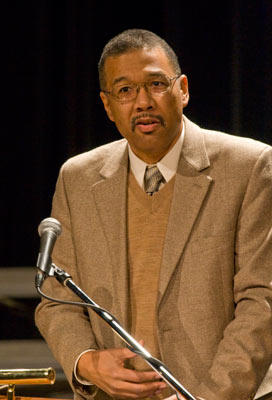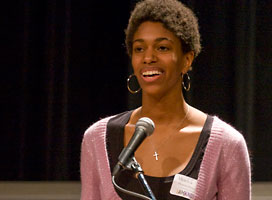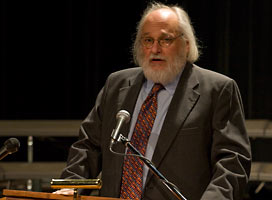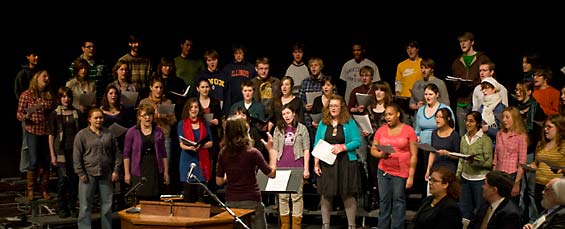

Venture Boldly

Office of Communications
2 East South Street
Galesburg, IL 61401

 "Non-violence does not seek to defeat the opponent, but to win his support," said Konrad Hamilton, professor of history at Knox College and chair of the American Studies program, in his remarks to the annual Martin Luther King, Jr. Day Convocation, January 18 on the Knox campus.
"Non-violence does not seek to defeat the opponent, but to win his support," said Konrad Hamilton, professor of history at Knox College and chair of the American Studies program, in his remarks to the annual Martin Luther King, Jr. Day Convocation, January 18 on the Knox campus.
Even though King's "direct action" civil disobedience protests disrupted society, Hamilton said, King believed that "non-violence left open the possibility of community in the future, while the result of violence is tragic bitterness."
To a packed audience in Harbach Theatre, Hamilton delivered the convocation address, "Conflict and Community: The Democratic Practice of Martin Luther King, Jr."
Hamilton posed questions to the audience: "How do people live together, with conflicting ideas an opinions? ... How much difference of opinion can be expressed, without destroying community?"
King's answer, Hamilton said, was "the beloved community," an idea that united oppressor and oppressed in a shared government of respect and affection."
Although, in 1968, "King questioned whether America had the will to bridge the gulf between the baves and the have-nots... he also referred to America as 'my beloved nation,' and stated that 'the goal of America is freedom'," Hamilton said.
 King's achievement, Hamilton said, was not "a blissfull happiness where conflicts go unspoken, but to fight for what we want without violence or oppression" -- a non-violent method that "does not seek to defeat the oppressor, but to win his support."
King's achievement, Hamilton said, was not "a blissfull happiness where conflicts go unspoken, but to fight for what we want without violence or oppression" -- a non-violent method that "does not seek to defeat the oppressor, but to win his support."
In remembering King, who was assassinated in 1968, "let's redirect ourselves to both understanding and to making the world a better place," said Vice President and Dean of the College Lawrence Breitborde.
Other speakers included President Roger Taylor and Magali Roy-Fequiere, associate professor and chair of the Gender and Women's Studies program.
Poetry selections were read by Frederick Hord, professor and chair of Black Studies, and Monica Prince, a sophomore from Lakewood, Colorado.
 The Knox College Choir, below, was directed by Margaret Wehr, a senior music major from Whitefish Bay, Wisconsin.
The Knox College Choir, below, was directed by Margaret Wehr, a senior music major from Whitefish Bay, Wisconsin.

Published on January 20, 2010